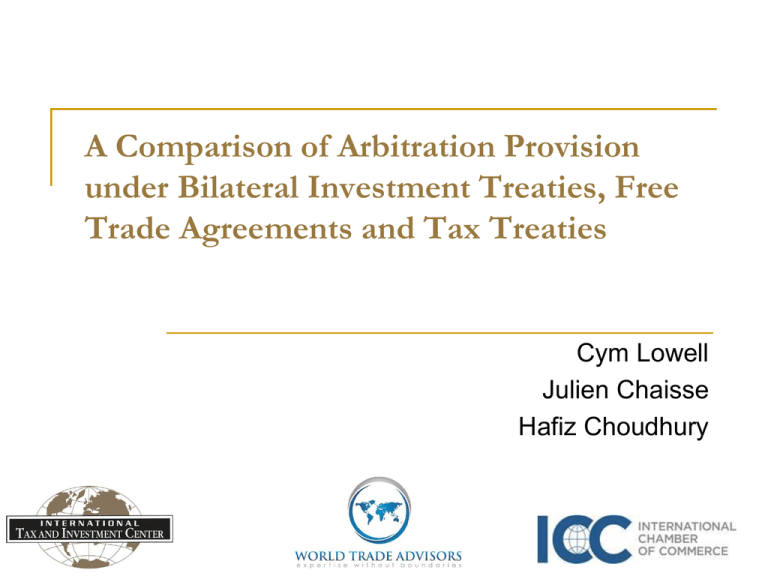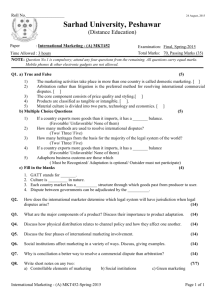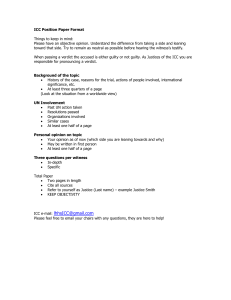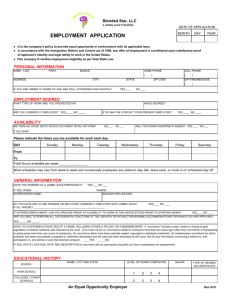A Comparison of Arbitration Provision under Bilateral Investment
advertisement

A Comparison of Arbitration Provision under Bilateral Investment Treaties, Free Trade Agreements and Tax Treaties Cym Lowell Julien Chaisse Hafiz Choudhury The global context Change in international business Growth of services in international trade in a regime designed originally for trade in goods Growth in intercompany transactions of global business Growth in international trade A globalized supply chain – centralization of certain functions, assets and risks in principal entities Growth in tax treaties and non-tax agreements Some numbers DTAs - approx. 3600 v. Bilateral Investment Treaties (BITs) – just over 3000 (400 in 1990) Increasingly South-South, not just North-South BITs do differ between countries Goals In program, arbitration in a variety of other nontax areas has been mentioned E.g. spoke of Inexperience of developing countries Concerns from governments on arbitration For tax way forward, there is mush to be learned from these other contexts Includes investment and trade agreements, commercial, state-to-sate and so on Look first at trends and practices in BITs covering arbitration and rule making Trends in investment rule-making Trends in IIAs signed, 1983–2013 (UNCTAD, World Investment Report 2014 at 115. Negotiate and you shall arbitrate! Known ISDS cases, annual (1987-2013) UNCTAD, 2014 Qualitative changes Rationae materiae expansion to include intangible assets Rise of Treaty shopping? Combined to extension of many substantive standards • Sovereign debt restructuring • Intellectual property rights (trade marks) • Commercial awards • Corporate structuring and restructuring to gain access to IIAs and ISA • FET, FPS, expro, NT Contrast between BITs and DTAs Tax treaties share a DNA / limited variations Variable of adjustment is the facts Tax treaties are the primary source of rights and obligations for both nations and taxpayers with respect to tax matters BUT, many other international treaties/agreements also affect taxation Agreements may extend new or alternative rights (e.g., dispute resolution) Agreements may affect national tax rules Agreements may offer rights that strongly influence tax planning Investment disputes dealing with tax matters 32 disputes (at least) Which responding states? When and which treaties? • 15 lost by host states • 17 won by states • Developing countries • Mexico, Burundi Peru, Venezuela, Russia, Ecuador, Argentina • NAFTA, ECT • Various BITs (US but also China, Netherlands, UK) Awards date Breaches Examples: Vodafone Vodafone’s tax dispute with India is currently in arbitration Vodafone invoked India-Netherlands Bilateral Investment Protection and Promotion Agreement Issue arises from 2007 purchase of $11B telecom business from Hutchison Whampoa Tax cost to Vodafone could be $3B+ In September 2014 parties agreed to extend deadline for selection of third arbitrator Vodafone states it is open to negotiation Examples: Yukos Yukos arbitration decision in July 2014 vividly illustrates the importance of non-tax treaties Former shareholders claimed that tax assessments amounted to expropriation Permanent Court of Arbitration agreed and awarded $50 billion, to be paid by January 2015 Award would have been higher, except for misconduct by claimants Tax treaties could never effectively grant this level of relief WTO/trade agreements and tax Trade agreements – multilateral, regional and bilateral – are also non-tax treaties that affect tax matters Trade and investment agreements differ but most promise WTO has clear dispute resolution mechanisms: “National treatment” “Most favored nation treatment” (MFN) Initial consultations can be seen as equivalent to MAP DSB Panel results in remedies binding for both countries. AB provides a forum for review. Takeaway for tax disputes Clear process, timelines, institutional structure. Remedies are binding and enforceable. Trade and tax disputes GATT ensures rights relating to trade in goods SCM Agreement prevents tax subsidies Key terms in Art. III - “so as to affect protection”, “affecting their internal sale”, “internal taxes” Application to indirect taxes is clear; application to direct taxes may not be clear Must be a “financial contribution”, - present when “Government revenue that is otherwise due is not collected” Foreign Sales Corporation (FSC) decision GATS agreement on services Carve out for DTAs and provision on equitable and effective imposition or collection of direct taxes WTO Panel Panama-Argentina – violation of MFN principle by Argentina on transactions between Argentinean residents with listed countries (incl. Panama) and also NT on entry of funds. Multiplicity of venues for BIT arbitration UNCITRAL Ad hoc PCA Rules ISA ICSID Institutional arbitration ICC Arbitral Awards as “Precedent”? No In theory Perhaps as non-binding ‘subsidiary means of determination of rules of law’ Art. 38(1)(d) Statute of ICJ(‘judicial decisions and the teachings of the most highly qualified publicists’) ICSID Convention, Art. 48, decisions binding on the parties only Other Comments Investment case-law? Tribunals inclined to rely on precedent However, some inconsistencies Variations in drafting, new issues ISA should be quick and inexpensive: it has become expensive and slow States have been forced to re-engineer their definitions ICC Process and Study BEPS Action # 14 identifies “obstacles” to arbitration They are not identified We know from BIT, WTO and so on that all countries, developed and developing, engage in a variety of arbitration formats This experience should provide a base for optimism in the tax context ICC Process and Study ICC commenced arbitration at same time as original post League of Nations took over tax treaty in 1926 Today, ICC Arbitration Commission and Court of Int’l Arb have extensive experience in commercial, stateto-state, investment and other arb contexts Other groups do as well ICC Tax’n Comm’n has consulted with its Arb Comm’n colleagues to ascertain if the same “obstacles” existed in these other areas at an early date Answer: yes ICC Process and study Based on experience, ICC identifies elements of developing successful arbitration programmes: Develop thorough understanding of “obstacles” Identify common objectives of the parties Study experience of successful Dis res mechanisms in other areas Outline proposed approach to address “obstacles” in the tax context Develop broad consensus ICC Process and study Implement with an institution having broad experience in administering cases through Dis res mechanisms in other contexts Study to be undertaken By ICC with other groups – e.g., UN, World Bank, IMF, Civil Society, NGOs and others with common interest Lessons for Arb of Tax Disputes Epochal change is coming in our tax world from BEPS, source country and other demands. Context: Countries: tax base protection MNEs: focus on ETR planning to take maximum advantage of regimes and prepare for disputes Disputes will proliferate Enhanced Dis Res is critical for all parties Selling points for all countries In present world economy, buy-in is necessary by developing and developed countries. Steeper curve ….. Must be commonly perceived benefits Look at experience in trade and investment area. Conclusions Process Structure BIT: successful but demonstrate need for states to design detailed system other arbitrators take over / far from being a mature regime Trade Commercial State-to-state ICC Study Organizational Framework







